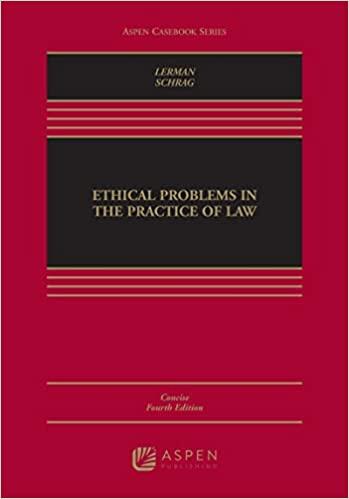Question
Urgent!! In which of the following cases did the court state that the power to punish is reserved to the state? Question 1 options: a)
Urgent!!
In which of the following cases did the court state that the power to punish is reserved to the state?
Question 1 options:
a) Wedner v. Fidelity Security Systems, Inc.
b) Garrity v. Lyle Stuart, Inc.
c) AFLAC, Inc. v. Williams.
d) Neri v. Retail Marine Corp.
Question 2 (1 point)
Forest sold the timber on Forest's land to Lumberjack, to be severed by Lumberjack with payment to be based on the number of trees cut. As Forest wanted to replant the land with sustainable hardwoods, Lumberjack agreed to clear-cut the land and to pay Forest $1 for any merchantable tree left
uncut. Lumberjack left 1,131 such trees uncut, and refuses to pay. If Forest sues:
Question 2 options:
a) Forest will recover liquidated damages, if the amount of the loss was difficult to determine.
b) Forest will recover liquidated damages, if the amount of damages was reasonably proportionate to the actual loss.
c) will not recover liquidated damages.
d) Both A and B.
Question 3 (1 point)
Wedner v. Fidelity Security Systems, Inc.:
Question 3 options:
a) cites the Restatement of Contracts to explain the legal basis for limitations on damages.
b) allows for limitations on damages to be used in any contract.
c) uses the parties' choice of label to distinguish between liquidated damages and limitations on damages.
d) allows any limitation to which the parties have agreed.
Question 4 (1 point)
Buyer orders a washing machine from Seller (an appliance store) for $500, with delivery on Friday. On Wednesday, Buyer emails Seller and cancels the order. The following week, Seller resells the washing machine to a third party for $500. When Seller sues Buyer for breach of contract, Seller's remedy will be:
Question 4 options:
a) the standard measure of damages.
b) the lost profit from the sale to Buyer.
c) the lost profit from the sale to Buyer, plus Seller's incidental damages (if any).
d) A and C.
Question 5 (1 point)
Which one of the following criteria is not considered by a court in distinguishing a valid liquidated damages clause from an invalid penalty clause?
Question 5 options:
a) Whether the parties intended to provide for damages rather than a penalty.
b) Whether the injury caused by the breach was uncertain or difficult to quantify.
c) Whether the sum stipulated was a reasonable pre-estimate of the likely loss.
d) Whether the sum stipulated was expressed by a liquidated sum.
Question 6 (1 point)
In which one of the following cases did the court find that a
minimum guarantee clause was an unenforceable penalty? Question 6 options:
a) Wedner v. Fidelity Security Systems, Inc.
b) Garrity v. Lyle Stuart, Inc.
c) AFLAC, Inc. v. Williams.
d) Lake River Corp. v. Carborundum.
Question 7 (1 point)
Which one of the following statements is not correct regarding the efficient breach theory?
Question 7 options:
a) Damages for mental distress and the time and effort to find a substitute performance are not compensable.
b) It assumes the absence of transaction costs.
c) The rules of contract damages often fail to compensate for all the losses of the party injured by the breach.
d) The business community accepts the theory as a valid justification for willful breaches.
Question 8 (1 point)
In AFLAC, Inc. v. Williams, the court stated all of the following
except:
Question 8 options:
a) the relationship between a lawyer and a client is a special one of trust.
b) a client has an absolute right to discharge the attorney.
c) an attorney can always enforce a retainer agreement in the event of discharge.
d) the practice of law is not simply a commercial enterprise.
Question 9 (1 point)
In which of the following cases did the court state that the name given to a damages cause by the parties has only slight weight,
but that the controlling elements are the parties' intent and the case's special circumstances?
Question 9 options:
a) Wedner v. Fidelity Security Systems, Inc.
b) Garrity v. Lyle Stuart, Inc.
c) AFLAC, Inc. v. Williams.
d) Neri v. Retail Marine Corp.
Question 10 (1 point)
The contract provides in part: "If Buyer breaches this contract and the enforcement thereof, or any provision thereof, or the collection of any moneys due hereunder is turned over to an attorney, Buyer herein agrees to pay, in addition to all of Seller's expenses, a reasonable counsel fee; and in the event the matter is turned over is the collection of moneys, such reasonable counsel fee is hereby agreed to be 30% of the total due." Is this provision enforceable?
Question 10 options:
a) Yes, additional agreed damages in the form of attorney's fees are enforceable.
b) Yes, additional agreed damages in the form of attorney's fees are enforceable, provided they are reasonable.
c) No, additional agreed damages in the form of attorney's fees are not enforceable.
d) No, additional agreed damages in the form of attorney's fees are not enforceable, unless the amount of attorney's fees is difficult to determine.
Step by Step Solution
There are 3 Steps involved in it
Step: 1

Get Instant Access to Expert-Tailored Solutions
See step-by-step solutions with expert insights and AI powered tools for academic success
Step: 2

Step: 3

Ace Your Homework with AI
Get the answers you need in no time with our AI-driven, step-by-step assistance
Get Started


